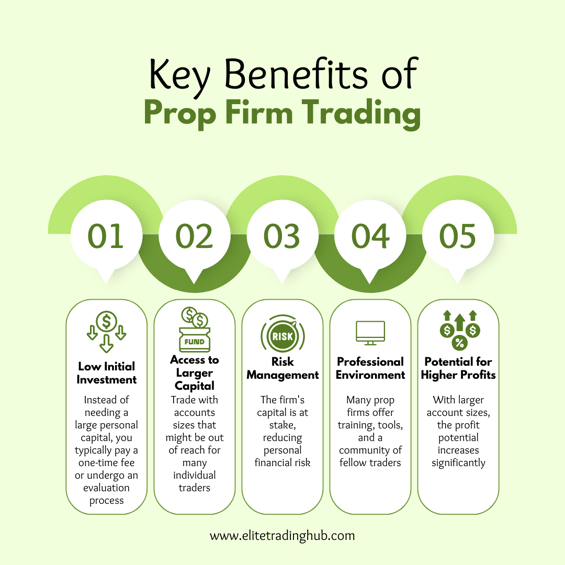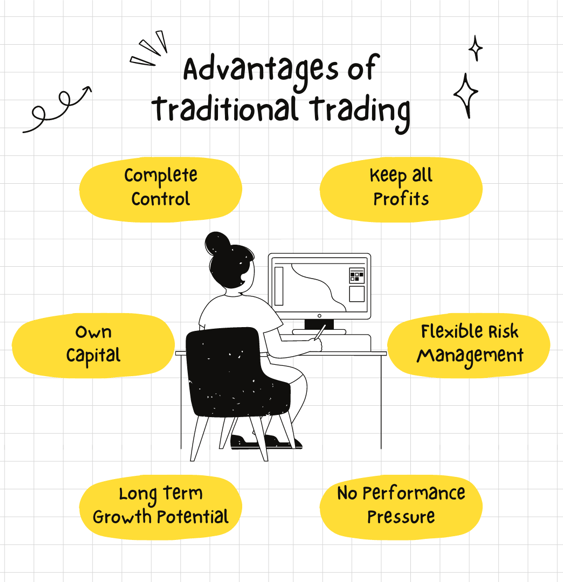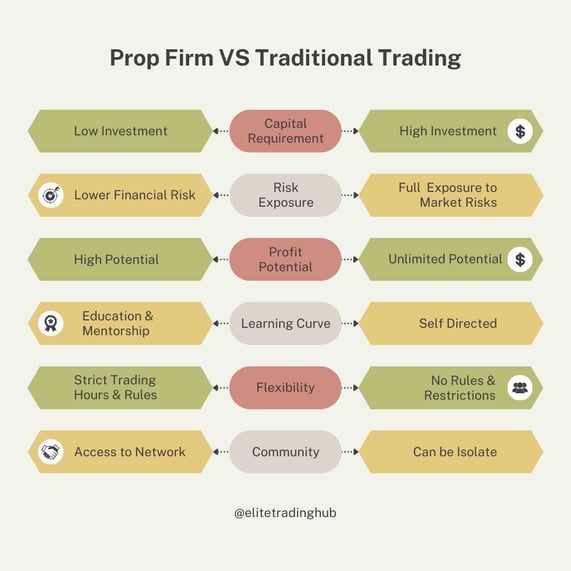Prop Firm vs. Traditional Trading: A Clear Comparison for Traders
Hey there, aspiring trader! 👋 Are you standing at the crossroads of your trading career, wondering which path to take? You're not alone. In 2024, the trading landscape is more diverse than ever, and two options stand out: prop firm trading and traditional trading. But which one is right for you? Let's dive in and explore these two worlds, helping you make an informed decision that could shape your financial future.
What's the Buzz About Prop Firms?
Prop firms, short for proprietary trading firms, have been making waves in the trading community. But what exactly are they, and why are they gaining so much traction?
The Prop Firm Proposition
Imagine having access to a substantial trading account without risking your life savings. Sounds too good to be true? Welcome to the world of prop firms! These companies offer funded trading accounts to skilled traders, allowing them to trade with the firm's capital in exchange for a share of the profits.
Key Benefits of Prop Firm Trading:


Low Initial Investment: Instead of needing a large personal capital, you typically pay a one-time fee or undergo an evaluation process.
Access to Larger Capital: Trade with accounts sizes that might be out of reach for many individual traders.
Risk Management: The firm's capital is at stake, reducing personal financial risk.
Professional Environment: Many prop firms offer training, tools, and a community of fellow traders.
Potential for Higher Profits: With larger account sizes, the profit potential increases significantly.
But it's not all smooth sailing. Prop firm trading comes with its own set of challenges:
Performance Pressure: You need to meet specific targets and follow strict rules.
Limited Freedom: Trading strategies and risk management are often dictated by the firm.
Profit Split: You don't keep 100% of your profits; the firm takes a share.
The Traditional Trading Route: Charting Your Own Course
Now, let's flip the coin and look at traditional trading. This is the path many envision when they think of becoming a trader – using your own capital to buy and sell financial instruments.
The Appeal of Going Solo
Traditional trading offers a level of independence that's hard to match. You're the captain of your ship, making all the decisions and reaping all the rewards (or bearing all the losses).
Advantages of Traditional Trading:


Complete Control: You decide what, when, and how to trade.
Keep All Profits: Every cent you make is yours to keep.
Flexible Risk Management: Set your own risk tolerance and adjust as needed.
No Performance Pressure: Trade at your own pace without external targets.
Long-term Growth Potential: Build your account over time without restrictions.
However, traditional trading isn't without its drawbacks:
Higher Initial Capital Required: You need to fund your own account, which can be substantial.
Full Personal Risk: Losses come directly out of your pocket.
Potential for Emotional Trading: Without external oversight, it's easier to make emotional decisions.
Solitary Journey: You might miss out on the community aspect found in prop firms.
Comparing the Two: A Deep Dive


Now that we've outlined both options, let's put them side by side and see how they stack up in key areas.
1. Capital Requirements
Prop Firms: 💰 Low initial investment, access to large trading accounts.
Traditional Trading: 💰💰💰 High initial investment, limited by personal capital.
2. Risk Exposure
Prop Firms: 🛡️ Lower personal financial risk, but higher stress due to performance targets.
Traditional Trading: 🎢 Full exposure to market risks, but with complete control over risk management.
3. Profit Potential
Prop Firms: 💹 High potential due to larger account sizes, but profits are split.
Traditional Trading: 📈 Unlimited potential, keep all profits, but limited by account size.
4. Learning Curve
Prop Firms: 📚 Often provide education and mentorship, but require adapting to firm's strategies.
Traditional Trading: 🧠 Self-directed learning, freedom to develop your own style.
5. Flexibility
Prop Firms: ⏰ Often have strict trading hours and rules.
Traditional Trading: 🕰️ Trade whenever and however you want.
6. Community
Prop Firms: 👥 Access to a network of traders and firm resources.
Traditional Trading: 🧑💻 Can be isolating, but online communities are available.
The 2024 Trading Landscape: What's Changed?
As we navigate through 2024, the trading world continues to evolve. Here are some trends shaping both prop firm and traditional trading:
AI and Machine Learning: Both sectors are leveraging AI for better analysis and decision-making.
Increased Regulation: Prop firms and individual traders alike are facing more scrutiny and oversight.
Democratization of Information: High-quality trading education is more accessible than ever.
Rise of Social Trading: Copy trading and community-driven strategies are gaining popularity.
Crypto Integration: Both prop firms and traditional platforms are increasingly incorporating cryptocurrency trading.
Making Your Choice: Factors to Consider
Choosing between prop firm and traditional trading isn't just about the money – it's about finding the right fit for your personality, goals, and lifestyle. Here are some questions to ponder:
How much capital can you comfortably risk?
Do you thrive under pressure or prefer a more relaxed approach?
Are you disciplined enough to stick to a trading plan without oversight?
How important is community support in your trading journey?
What are your long-term career goals in trading?


The Hybrid Approach: Best of Both Worlds?
Here's a thought – why choose just one? Many successful traders in 2024 are adopting a hybrid approach. They maintain a personal trading account for long-term investments and strategies while also trading with a prop firm to access larger capital and potentially accelerate their trading career.
This approach allows you to:
Diversify your trading activities
Learn from prop firm experiences and apply insights to personal trading
Balance the stability of personal trading with the high-reward potential of prop firms
Conclusion: Your Trading Journey Awaits
Whether you choose the structured environment of a prop firm, the independence of traditional trading, or a mix of both, remember that success in trading comes down to skills, discipline, and continuous learning.
Both paths offer unique advantages and challenges. Prop firms can be a fantastic launchpad, especially if you're short on capital but long on skills. Traditional trading, on the other hand, offers unparalleled freedom and the potential for long-term wealth building.
The key is to align your choice with your personal goals, risk tolerance, and trading style. And remember, the path you choose today doesn't have to be your forever route. Many successful traders have switched between prop firms and traditional trading as their careers evolved.
Ready to make your decision? Take our quick survey below to get a personalized suggestion based on your preferences and situation. And whatever path you choose, here's to your success in the exciting world of trading! 🚀📊
Trading Style Survey
Let's find out which trading style might suit you best! Answer these quick questions:
Based on your answers, we'll suggest whether prop firm trading, traditional trading, or a hybrid approach might be best for you. Remember, this is just a starting point – always do your own research and consider seeking advice from financial professionals before making any trading decisions.
Happy trading, and may the markets be ever in your favor! 📈🍀
